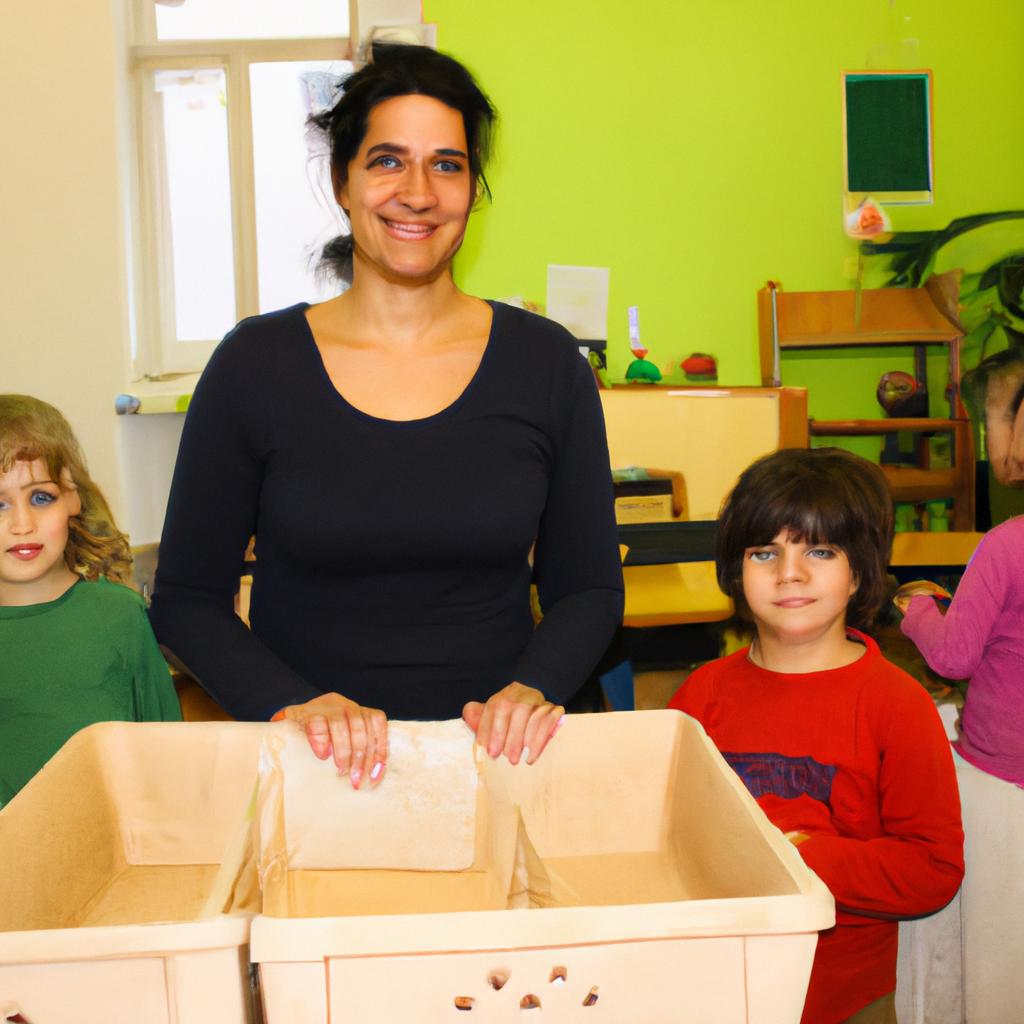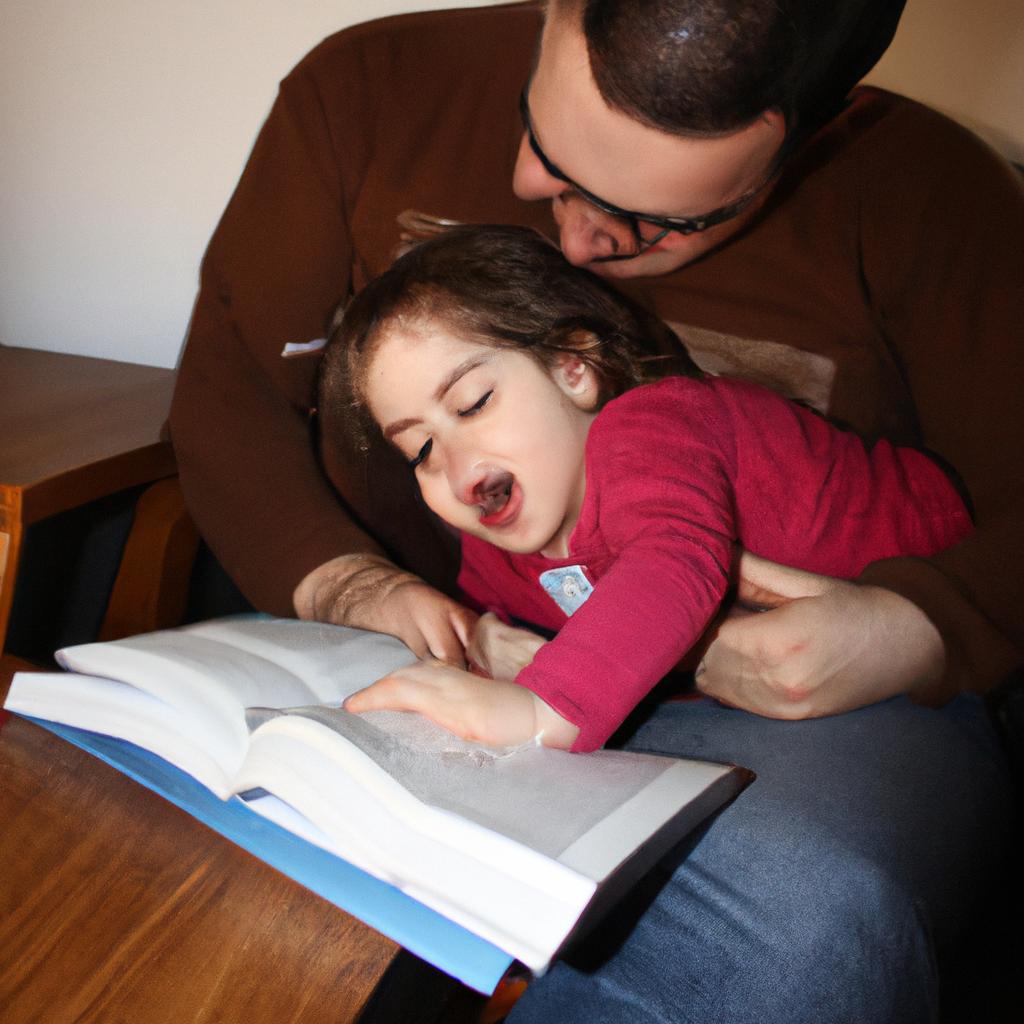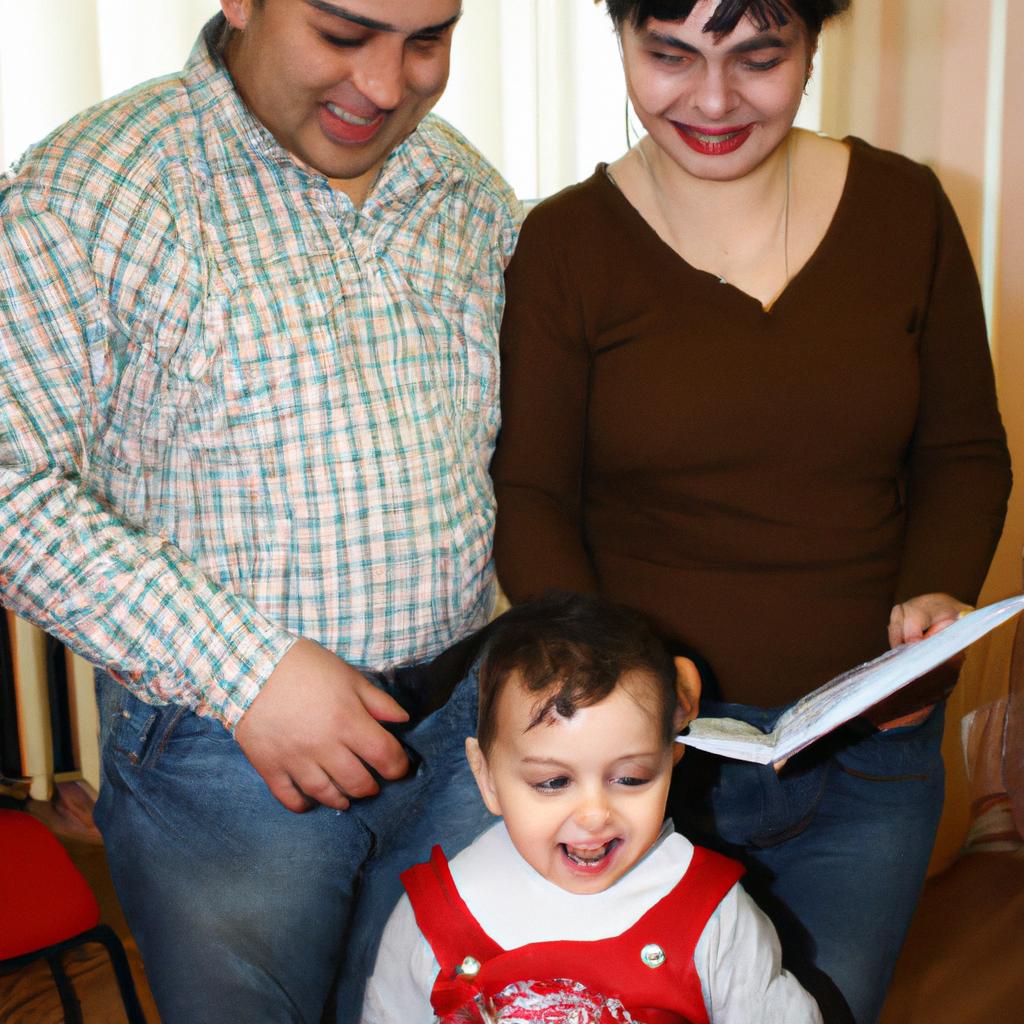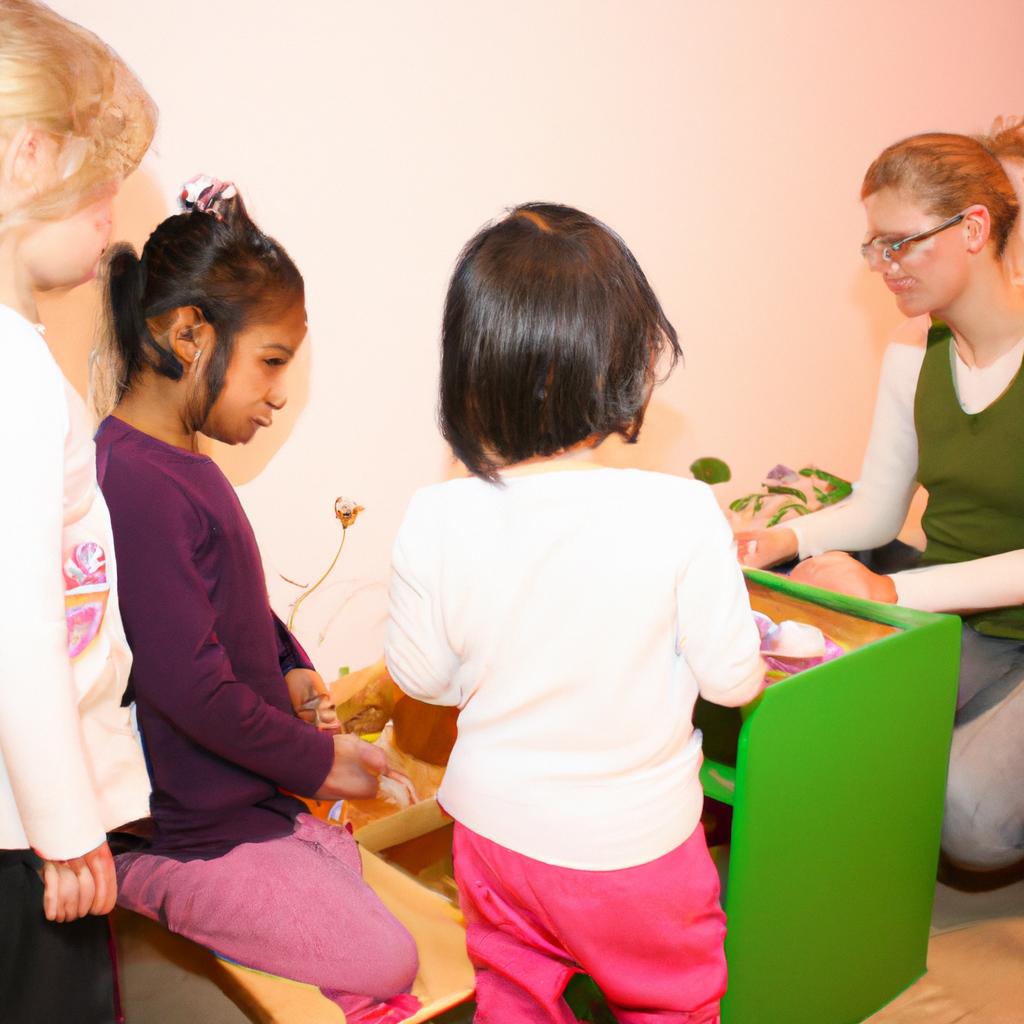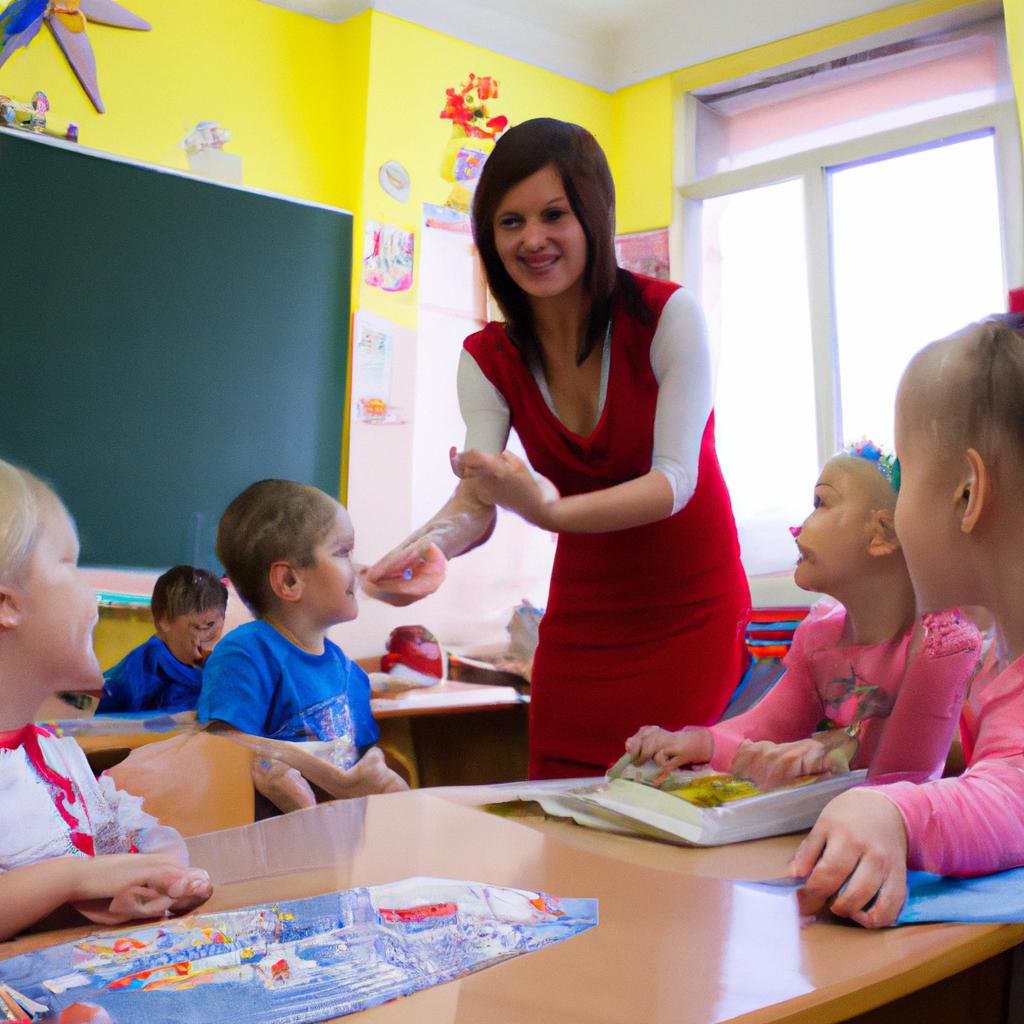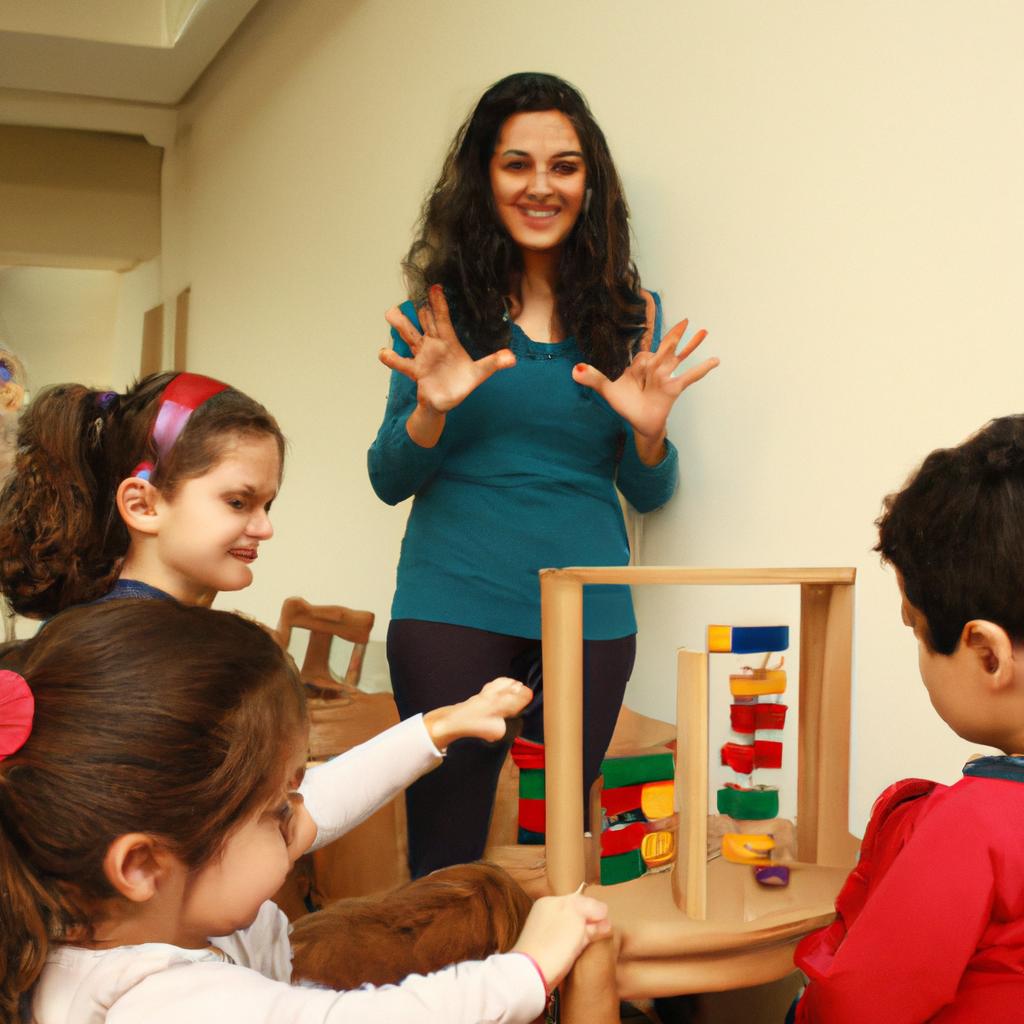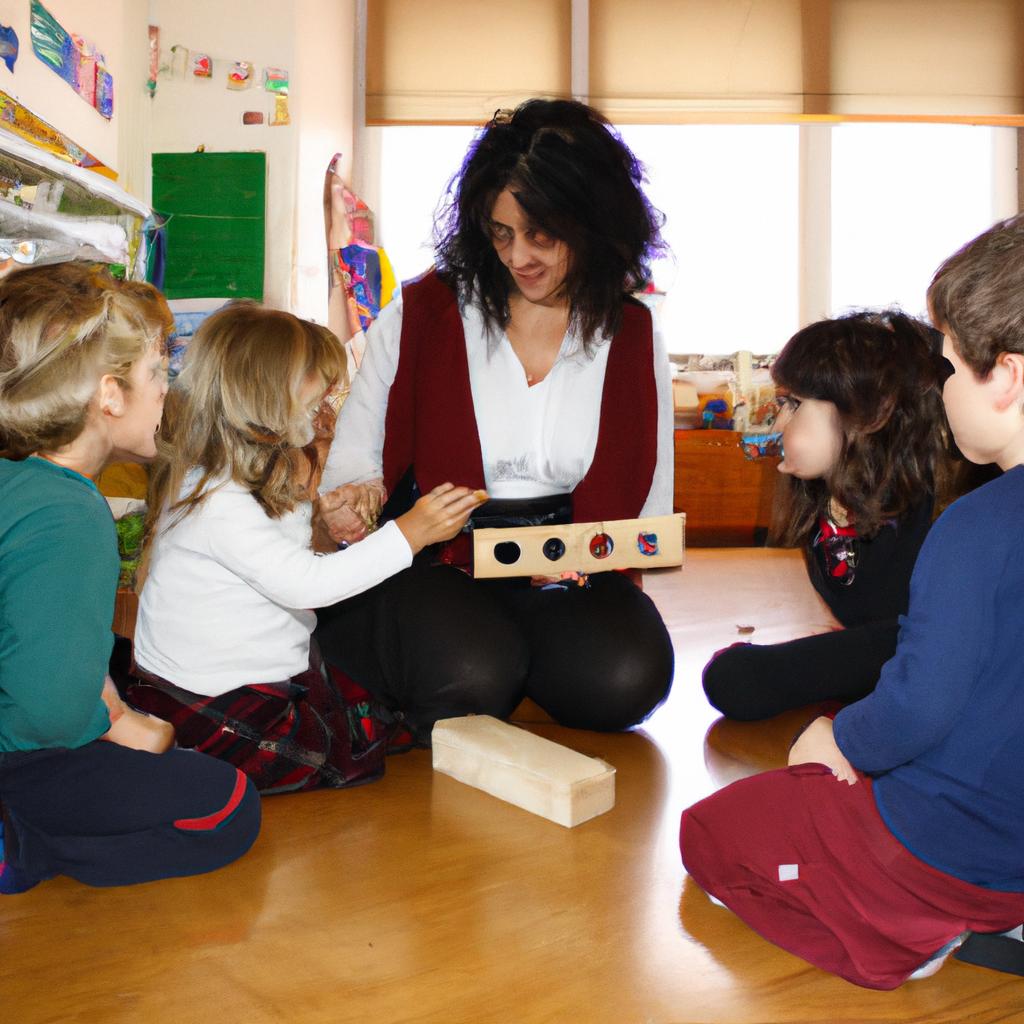Parent involvement is crucial in the education of children, and Montessori schools recognize this by actively engaging parents through Parent Advisory Committees (PACs). These committees serve as a platform for parents to contribute their ideas, opinions, and expertise towards enhancing the overall educational experience at Montessori schools. For instance, imagine a hypothetical scenario where a PAC was formed at a local Montessori school. Parents on the committee would work collaboratively with teachers and administrators to address concerns such as curriculum development, extracurricular activities, and community engagement.
The establishment of PACs not only promotes parent participation but also strengthens the partnership between home and school. Research has consistently shown that when parents are involved in their child’s schooling, academic achievement improves, behavior becomes more positive, and overall school experiences become richer. With PACs in place, Montessori schools provide an avenue for parents to have meaningful input into decision-making processes while fostering open communication channels between families and educators. By working together towards shared objectives, both parents and teachers can create an environment that supports students’ holistic development academically, socially, emotionally, and physically.
Role of Parent Advisory Committees
Role of Parent Advisory Committees
Parent advisory committees play a crucial role in fostering parent involvement in Montessori schools. By providing parents with a platform to voice their opinions and contribute to decision-making processes, these committees create a sense of ownership and empowerment among families within the educational community. To illustrate this point, consider the following hypothetical case study: at Hilltop Montessori School, the establishment of a parent advisory committee led to increased collaboration between parents and staff, resulting in improved school policies and enhanced student experiences.
One key function of parent advisory committees is to facilitate effective communication between parents and school administrators. Through regular meetings, newsletters, and online platforms, these committees provide channels for sharing information about school programs, events, and initiatives. Additionally, they serve as intermediaries in addressing concerns or suggestions raised by parents. This open line of communication fosters transparency and builds trust between home and school.
Furthermore, parent advisory committees actively involve parents in shaping the direction of their child’s education. These committees often participate in discussions regarding curriculum development, resource allocation, and extracurricular activities. By engaging in such collaborative decision-making processes, parents are able to contribute unique perspectives that enrich the overall learning environment.
To evoke an emotional response from readers when discussing the impact of parent advisory committees on parental involvement, consider the following bullet points:
- Increased sense of belonging and connection for both parents and students.
- Enhanced understanding of Montessori philosophy through active engagement.
- Strengthened relationships between teachers/staff and families.
- Improved academic outcomes due to increased support systems.
Additionally, let us incorporate a table into this section that showcases examples of specific contributions made by parent advisory committees:
| Contribution Area | Examples |
|---|---|
| Curriculum Development | Providing input on materials selection |
| Fundraising | Organizing annual gala event |
| Community Engagement | Coordinating volunteer opportunities |
| School Improvement | Advocating for facility upgrades |
In conclusion, parent advisory committees play a vital role in fostering parent involvement within Montessori schools. By providing platforms for communication and collaborative decision-making, these committees not only empower parents but also enhance the overall educational experience for students. In the subsequent section, we will explore the benefits of such parental involvement in Montessori education.
Benefits of Parent Involvement in Montessori Education
Having explored the crucial role played by Parent Advisory Committees (PACs) in facilitating effective communication and collaboration between parents, teachers, and administrators within Montessori schools, we now turn our attention to understanding the benefits that arise from increased parent involvement. To illustrate this further, consider the following hypothetical scenario:
Example Scenario:
Imagine a child named Emily who attends a Montessori school where her mother is actively involved in the PAC. As a result of her mother’s engagement, Emily experiences enhanced support both at home and within the classroom. Her mother regularly communicates with Emily’s teacher about her progress and any specific needs she may have. This open line of communication allows for personalized learning strategies tailored to Emily’s unique developmental journey.
Benefits of Parent Involvement in Montessori Education:
-
Enhanced Child Development:
- Increased parental involvement fosters a stronger connection between home and school environments, leading to improved academic performance.
- Parents become more aware of their child’s individual strengths and challenges, enabling them to provide targeted support outside of school hours.
- Active participation in their child’s education instills a sense of ownership and accountability among parents, which positively impacts overall student achievement.
-
Strengthened School Community:
- Collaborative efforts between parents, teachers, and administrators create a supportive community centered around the well-being and success of every student.
- The establishment of trust through regular dialogues promotes transparency and ensures shared decision-making regarding curriculum development or policy changes.
- By fostering an inclusive environment that values diverse perspectives, parent involvement contributes to the creation of a vibrant educational ecosystem.
-
Improved Teacher-Parent Relationship:
- Regular interactions with parents enable teachers to gain valuable insights into each child’s background, interests, and learning styles.
- Teachers can tailor their instructional approaches based on this knowledge, leading to more personalized and effective teaching methods.
- The partnership between parents and teachers cultivates mutual respect and understanding, resulting in a supportive network that benefits both the child and the school community.
Table: Emotional Impact of Parent Involvement
| Positive Emotion | Example |
|---|---|
| Joy | Witnessing your child’s progress firsthand brings immense joy. |
| Pride | Being actively engaged in your child’s education fills you with pride. |
| Fulfillment | Knowing that you are contributing to your child’s growth is fulfilling. |
| Connection | Building relationships within the school community creates a sense of connection. |
Understanding the numerous advantages associated with parent involvement highlights its importance as we explore effective strategies for engaging parents in Montessori schools. By recognizing the emotional impact it has on families, educators can create meaningful opportunities for collaboration and shared success without undermining the significance of parental contributions.
Effective Strategies for Engaging Parents in Montessori Schools
Building upon the previous discussion on the benefits of parent involvement in Montessori education, it is essential to explore effective strategies for engaging parents in these schools. By implementing successful approaches, Montessori educators can foster an environment that encourages parental participation and collaboration. To illustrate this further, let’s consider a hypothetical case study.
Case Study:
Imagine a Montessori school that struggled with low levels of parent involvement. The administration recognized the importance of addressing this issue to create a more inclusive learning community. Through targeted efforts and open communication channels, they successfully increased parent engagement, resulting in improved student outcomes and overall satisfaction.
Effective Strategies for Engaging Parents in Montessori Schools:
-
Regular Communication Channels:
- Establish clear lines of communication between teachers and parents through regular newsletters, emails, or online platforms.
- Provide updates on classroom activities, upcoming events, and curriculum highlights to keep parents informed and engaged.
- Encourage two-way communication by inviting parents to share their thoughts or concerns about their child’s progress.
-
Parent Advisory Committees:
- Create parent advisory committees composed of interested individuals who represent diverse perspectives within the school community.
- Collaborate with committee members to develop initiatives that promote parental involvement and support various school programs.
- Utilize these committees as a means to gather feedback from parents regarding decision-making processes within the school.
-
Workshops and Training Sessions:
- Organize workshops and training sessions specifically designed for parents to enhance their understanding of the Montessori philosophy and educational approach.
- Offer guidance on how parents can reinforce Montessori principles at home while supporting their child’s development.
- Provide resources such as reading materials or online tools that further deepen parental knowledge in areas relevant to Montessori education.
-
Celebrating Achievements Together:
- Recognize and celebrate both student achievements and contributions made by involved parents within the school community.
- Organize events such as exhibitions, performances, or showcases where parents can actively participate and witness their child’s progress.
- By acknowledging the collective efforts of parents and educators, a sense of shared accomplishment is fostered.
Table: Benefits of Parent Involvement in Montessori Education
| Benefit | Description |
|---|---|
| Enhanced Academic Success | Studies have shown that students with involved parents tend to perform better academically. |
| Improved Behavior | Active parental engagement has been linked to reduced behavioral problems among students. |
| Increased Motivation | When parents are involved, children often exhibit higher levels of motivation and enthusiasm for learning. |
| Strengthened Relationships | Collaborative partnerships between parents and educators establish strong relationships within the school community. |
Recognizing the significance of communication between parents and Montessori educators, let us now explore its importance in creating an effective learning environment for students.
Importance of Communication between Parents and Montessori Educators
Having explored effective strategies for engaging parents in Montessori schools, it is crucial to recognize the significance of communication between parents and educators. By establishing open lines of communication, both parties can work collaboratively towards fostering a supportive educational environment for children.
Case Study Example:
To illustrate the importance of communication, let us consider a hypothetical case study involving a preschooler named Emily. Emily’s parents noticed that she was becoming increasingly disinterested in attending school and her academic progress seemed to be stagnating. Concerned about their daughter’s well-being, they decided to communicate their observations with her Montessori educator during a parent-teacher conference. Through this conversation, they discovered that Emily had recently experienced some personal challenges at home which were affecting her engagement in school. With this newfound awareness, the teacher was able to provide additional support tailored to Emily’s specific needs, resulting in her renewed enthusiasm for learning.
Effective Strategies:
-
Regular Parent-Teacher Conferences: These meetings offer an opportunity for parents and educators to discuss a child’s progress academically, socially, and emotionally. It allows teachers to share insights into classroom activities while also providing parents with an avenue to express any concerns or observations they may have regarding their child’s development.
-
Newsletters and Communication Platforms: Utilizing newsletters or online platforms can help keep parents informed about important information such as upcoming events, curriculum updates, and general announcements from the school. This not only enhances transparency but also promotes ongoing dialogue between parents and educators.
-
Home-School Collaboration Projects: Collaborative projects that involve both students and their families create opportunities for meaningful interactions outside the traditional classroom setting. For instance, organizing family-focused events like art exhibitions or science fairs encourages active participation from parents while promoting deeper connections within the community.
Emotional Impact Table:
| Benefit | Emotional Response |
|---|---|
| Enhanced Trust | Parents feel more involved and valued |
| Improved Student Performance | Parents feel a sense of pride and accomplishment |
| Shared Responsibility | Both parents and educators feel supported |
| Stronger Parent-Teacher Partnership | Parents and educators experience increased satisfaction |
In conclusion, effective communication between parents and Montessori educators plays an integral role in creating a supportive educational environment. By engaging in regular conversations, utilizing newsletters or online platforms, as well as promoting home-school collaboration projects, both parties can foster trust, improve student performance, share responsibility, and establish stronger partnerships. Through open lines of communication, the stage is set for creating a collaborative environment for parents and educators to work together towards the holistic development of children.
Establishing effective communication practices sets the foundation for creating a collaborative environment for parents and educators in Montessori schools.
Creating a Collaborative Environment for Parents and Educators
Building on the importance of effective communication between parents and Montessori educators, fostering a collaborative environment is crucial to ensure meaningful parent involvement in Montessori schools. By creating opportunities for parents to actively participate in decision-making processes and engaging with them as partners, these committees can enhance parental engagement and support student success.
To illustrate the impact of parent advisory committees, let’s consider a hypothetical case study. Imagine a Montessori school that establishes a committee consisting of parents from diverse backgrounds who are passionate about their children’s education. This committee meets regularly with educators to discuss curriculum development, school policies, and community outreach initiatives. Through open dialogue and shared decision-making, this collaboration fosters trust, strengthens relationships, and ultimately improves the overall educational experience for students.
Parent advisory committees can be instrumental in promoting parent involvement by:
- Facilitating two-way communication channels between parents and educators
- Encouraging active participation in school activities through volunteering or organizing events
- Providing an avenue for constructive feedback and suggestions regarding the school’s practices
- Supporting fundraising efforts to enhance resources and extracurricular opportunities for students
The following table highlights some potential benefits associated with establishing parent advisory committees:
| Benefit | Description |
|---|---|
| Increased sense of belonging | Parents feel valued, included, and connected to the school community |
| Enhanced transparency | Clear communication promotes understanding of decisions made by educators |
| Improved student outcomes | Collaboration between parents and educators positively impacts academic achievement |
| Strengthened partnership | Trusting relationships fostered through collaboration lead to better home-school cooperation |
By nurturing strong partnerships between parents and educators through such committees, Montessori schools can empower families to contribute meaningfully to decision-making processes. The subsequent section will explore strategies aimed at involving parents in shaping important aspects of their child’s educational journey without undermining the expertise of Montessori educators.
Empowering Parents to Contribute to Montessori School Decision Making
Building upon the collaborative environment established between parents and educators, Montessori schools can further empower parents by involving them in decision-making processes. This involvement is essential to ensure that parental perspectives are taken into account when shaping school policies and practices. By establishing parent advisory committees, Montessori schools create opportunities for meaningful parent engagement and foster a sense of ownership within the community.
Case Study Example:
To illustrate the impact of parent advisory committees, consider a hypothetical case study of Maplewood Montessori School. The school recently formed a committee consisting of five parents who represent different grade levels. These parents meet on a monthly basis with the school administration to discuss various aspects related to curriculum development, extracurricular activities, and overall school improvement efforts. Through this collaboration, the committee has successfully influenced decisions such as implementing new technology tools in classrooms, organizing community events to promote cultural diversity, and enhancing communication channels between teachers and parents.
Parent Advisory Committees: Fostering Parent Involvement
In order to understand the significance of parent advisory committees, it is important to explore their role within Montessori schools. Here are key points highlighting how these committees contribute to fostering parent involvement:
- Increased Parent Engagement: Parent advisory committees provide an avenue for parents to actively participate in their child’s education. By being involved in decision-making processes, parents feel more connected to the school community and develop a deeper understanding of its values and goals.
- Collaborative Decision Making: Through regular meetings and open discussions, parent representatives have an opportunity to voice concerns, suggestions, and ideas regarding various aspects of school operations. This collaborative decision-making process ensures that diverse perspectives are considered when making important choices.
- Transparent Communication Channels: Parent advisory committees facilitate transparent communication between parents and educators. They serve as a platform where information flows both ways – from administrators informing parents about upcoming initiatives or changes,and vice versa.
The formation of parent advisory committees evokes the following emotional responses from parents, educators, and students:
- Sense of Belonging: Parents feel a sense of belonging and connection to the school community, fostering a stronger partnership with educators.
- Empowerment: Parents experience empowerment as they actively contribute to shaping their child’s educational experiences.
- Trust and Respect: Collaboration between parents and educators builds trust and mutual respect, creating an atmosphere conducive to effective communication.
- Enhanced Student Support: The involvement of parents in decision making ensures that student needs are prioritized and met.
Emotional Table:
| Emotional Response | Impact on Parents | Impact on Educators |
|-------------------------|----------------------------|----------------------------|
| Sense of Belonging | Strengthened relationships | Increased parent support |
| Empowerment | Active engagement | Improved parent satisfaction |
| Trust and Respect | Open communication channels | Collaborative partnerships |
| Enhanced Student Support | Increased advocacy | Targeted interventions |
In conclusion, parent advisory committees play a crucial role in involving parents in decision-making processes within Montessori schools. By providing opportunities for collaboration, transparent communication, and meaningful engagement, these committees foster a sense of ownership among parents while ensuring that their perspectives shape school policies. Through case studies like Maplewood Montessori School, we can witness the positive impact such committees have on both the emotional well-being of individuals involved and the overall success of Montessori education.


